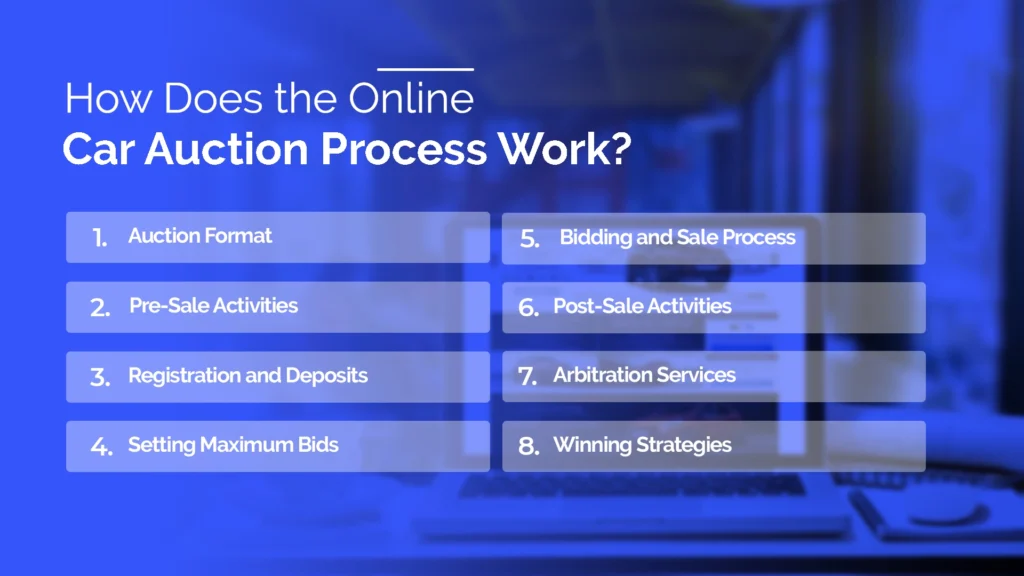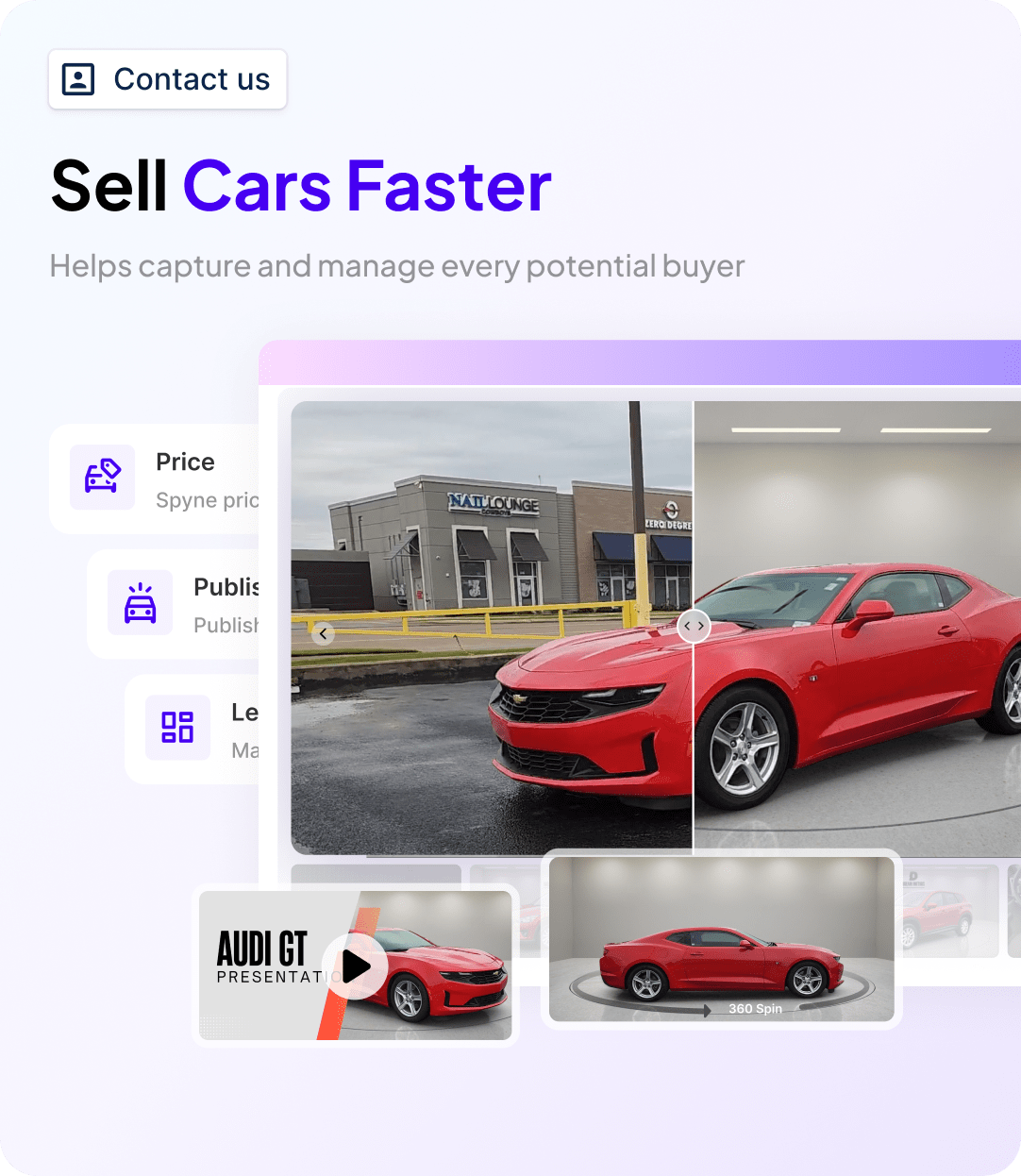Car auctions are not limited to expensive vintage cars but now have become a way of shopping online for all cars – commercial or dealer vehicles. They serve an important purpose for both sellers and buyers by bringing them on a single platform and getting the most benefit out for both parties.
A state of auction industry report found 48% of dealer vehicles were purchased by online buyers, which is expected to grow in the coming years. To meet this demand, it becomes important for dealerships to not only sell at a profit margin but to buy vehicles at a great margin, too.
Whether you are a beginner or an expert at car auctions, having knowledge of car auction inventory management is an added advantage.
What is a Car Auction Inventory Management?
Car auction inventory refers to the collection of vehicles that are available for purchase at a car auction, which ranges from day-to-day cars to high-end models. This inventory is managed through its collection cycle based on planning, organizing, and then controlling the flow of vehicles from acquisition to sale.
Car auction inventory management requires strategic decisions about what cars to buy, when to sell, and how to market them. It allows for a seamless process, hence yielding maximum return on investment (ROI) and diversity in one place. As a used car dealership, it is essential to plan your inventory cycle, and using a car auction inventory playbook will help you achieve your goals.
Why is Car Auction Inventory Important?
Car auction inventory is essential for several reasons for a used car dealership, as it affects their bottom line, improves processes, and helps in building successful sales processes. Moreover, car auctions used cars let dealers buy more vehicles at a time compared to private sales – helping them quickly restock their inventory with reliable options. It also cuts down on shipping expenses since they can transport several cars in one go. Let’s explore why auction used cars work great for dealerships:
Cash Flow and Profitability
When using a public auto auction inventory management system, used car dealerships can avoid overcrowding or under crowding, resulting in lesser storage and maintenance costs. With this dealers can make quicker and more profitable sales, maximizing their ROI.
Meets Customer Demand
A well-managed inventory ensures a proper mix of vehicles matching demand. Adaptability thus enhances customer satisfaction and maximizes sales.
Enhances Competitiveness
Effective inventory management shall help set you apart from other competitors. Quality and in-demand vehicles attract more buyers for your brand and encourage brand loyalty.
Improves Decision-Making
Strategic car auction inventory management allows effective decision-making regarding the selection of available vehicles, the optimal time to sell, and the right price to sell them. It aligns inventory with market trends.
Reduces Risks
Proper management minimizes risks such as depreciation and unsold stock. Proper inventory management ensures smooth operations and better financial stability.
What are the Challenges in Managing Car Auction Inventory?
Vehicle inventory management software for auctioning used cars involves navigating various complexities, from market competition to evolving customer demands. Therefore, here are the key challenges that auction houses face in new or used car inventory management:
Fragmented Market and Fierce Competition
The car auction industry is divided among many local, regional, and global players, leading to inefficiencies and inconsistent practices. This fragmentation makes it tough to predict stock availability and adds intense competition, further complicating car auction inventory management.
Trust Issues in Digital Auctions
With the shift from physical to online auctions, building trust is a big hurdle. Buyers worry about misrepresented vehicles, hidden defects, and payment security. Transparent processes and secure systems are crucial to maintaining confidence in digital platforms.
Balancing Inventory Levels
Keeping the right number of vehicles in stock is tricky. Too much inventory can drive prices down, while too little risks losing buyer interest. Auction houses need accurate demand forecasting and market analysis to strike the perfect balance to auction used cars and the buyers.
Pricing Challenges Without Data
Setting reserve prices and starting bids requires real-time data on market trends. Without proper analytics, auction houses risk pricing mistakes that can lead to unsold inventory or reduced profits.
Meeting Diverse Customer Needs
Buyers have varying preferences, from budget-friendly cars to luxury models. Managing car auction inventory to cater to all these needs requires flexibility and a smart segmentation strategy to keep everyone satisfied.
Adapting to Electric Vehicles (EVs)
The rise of EVs adds a layer of complexity. Auction houses need to include EV-specific auctions, educate buyers about the benefits, and adjust to the declining interest in traditional internal combustion engine (ICE) vehicles.
Cross-Border Logistics and Compliance
International transactions involve challenges like varying taxes, shipping logistics, and compliance with different regulations. Strong systems and processes are needed to handle these complexities smoothly.
Sustainability Expectations
With the growing demand for eco-friendly practices, auction houses must adopt sustainable methods like recycling, reducing environmental impact, and integrating green initiatives into automotive inventory management.
How Does the Online Car Auction Process Work?
Online car auctions are a modern way for dealers to buy and sell vehicles. The entire process happens digitally, making it convenient and efficient. Here’s a simple breakdown of how it works:
1. Auction Format
Online car auctions follow a set schedule for bidding. Some allow extensions if bids come in at the last minute, while others have fixed start and end times. Understanding these rules helps dealers plan better.
2. Pre-Sale Activities
Before the auction, vehicles go through these steps:
- Consignment: Vehicles are delivered to the auction by transport trucks, rail, or even dealership staff. Once they arrive, their details are recorded using their Vehicle Identification Number (VIN). Photos are also taken for online listings.
- Condition Reports: Auction experts inspect the vehicles and create detailed reports about their condition. These reports help dealers understand any repairs needed and the car’s potential value.
- Marketing: Auctions promote upcoming sales through emails, ads, and flyers. They often run special offers or prizes to attract more buyers.

3. Registration and Deposits
Dealers need to register on the auction platform by providing their details. A deposit is usually required to confirm participation and prevent non-serious bidding.
4. Setting Maximum Bids
Dealers can set a maximum amount they’re willing to pay for a vehicle. The auction system will automatically place bids up to that limit on car auctions used cars, saving time and effort.
5. Bidding and Sale Process
Vehicles are auctioned one by one in a fast-paced process. Each vehicle gets a “run number,” which tells when it will be up for bidding. Auctions usually last around 60 seconds per vehicle, so dealers need to act quickly.
6. Post-Sale Activities
After the auction, several things happen:
- Payment and Paperwork: Auction staff handles payments, titles, and financing.
- Transportation: Dealers can arrange for the vehicles to be delivered directly to their lot.
- Advertising: Auctions help dealers list their newly purchased cars on websites to speed up resale.
7. Arbitration Services
If there’s an issue with a purchased vehicle, dealers can use the auction’s arbitration services. These experts mediate and resolve problems to ensure fairness.
8. Winning Strategies
To succeed, dealers should focus on specific vehicles, research the market, and use bidding tools wisely. Staying prepared and active during the auction can make a big difference.
What are the Different Types of Car Auctions?
Car auctions have many types, varying according to buyer preferences and demands. Though the auction process is quite similar for all, they can generally be broken down into two major categories closed or private auctions and open or public auctions. These categories have specific variations catering to the needs of the different buyers.
1. Closed or Private Auctions
Closed auctions involve events in which only a few buyers and sellers are allowed to participate. This is usually through invitation and, thus many such closed events are prearranged for professionals in the trade, like car dealerships or wholesale buyers. A main reason why closed auctions are significant is because they are usually events where there is a relatively controlled environment with competitive pricing.
- Dealer Auctions: Private auctions for autos wherein car dealerships and insiders in the industry sell vehicles for resale. In general, these are vehicles in excellent working condition and perhaps even newer models. Their access is usually restricted to dealers; however, a consumer might get in through his contact in the industry or by hiring a proxy bidder.
- Government Auctions: These auctions are conducted by government agencies to sell cars formerly under its fleet. Government auction cars are mostly well-kept, but buyers should expect them to run for higher mileage. The said auction may also include cars seized by law enforcement. Although the cars are not brand new, they can be availed at affordable prices.
2. Open or Public Auctions
Open auctions are available to the general public. Many of these events can be held online to reach a global audience. Open auctions benefit from having large pools of participants, so there’s often high competition for cars, and prices can potentially rise. This is especially the case for classic car auctions in the USA and classic public auto auction inventory, where enthusiasts flock to bid on valuable collector’s items.
- Salvage Auctions: Salvage car auctions are those that have been declared total losses by the insurance company due to an accident, flood, fire, or any other severe damage. These cars may sell at a much-reduced price than non-damaged vehicles but usually need substantial repairs to be driveable again. Additionally, salvage auctions may be ideal for buyers who are capable of repairing the vehicles themselves or can obtain the services.
- Repossession Auctions: These sell cars that were repossessed because the owners missed payments or abandoned them. Cars are sold for a lower price; however, the condition can be worse than elsewhere, so buyers should be very careful.
3. Online Car Auctions
Selling cars at online auction has emerged as one of the most convenient ways to buy and sell cars. Many platforms allow for both used car auction inventory and classic car auction inventory to be sold globally. These auctions provide access to more buyers and sellers, and as a result, you have greater options and pricing flexibility. The main advantage of online auctions is the ease of access and the wide variety of vehicles available. However, the disadvantage is that buyers cannot inspect a car before bidding; instead, they rely on descriptions and photographs provided by the seller.
4. Specialized Auctions
Besides the general car auction categories mentioned above, there is one more specialized kind of car auction that targets specific types of vehicles or situations, that is, Government and police car auctions which are often hosted by different state police departments and the GSA. Surplus government vehicles are mainly those with no questionable background, and mostly well-maintained, though sometimes they also include confiscated vehicles with questionable histories.
How can Spyne Help in Managing Car Auction Inventory?
Automotive dealerships can only be successful if they are selling multiple vehicles on a daily basis, and that can only be achieved if they have cars in their inventory. However, that is not the case with a lot of used car dealerships.
With car auction inventory management in place, used car dealerships can not only track their auction inventory but also plan how many new vehicles they can purchase. Spyne, with its inventory management platform, can supplement the growing dealership needs and help them scale with ease and confidence.
Conclusion
To succeed at car auction inventory management, the dealers are supposed to show a keen interest in research, networking with seasoned bidders, and sticking to a budget. Additionally, being early to register allows getting hold of the best cars, and knowing when to walk away helps avoid impulse purchases. A dealer is supposed to recognize sales tactics that push you to overspend. With these strategies, one can make smart, profitable bids, eventually winning better deals and long-term success in the auction world.
















